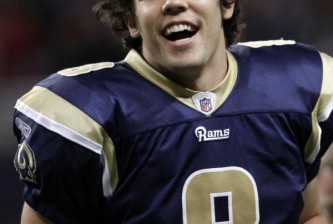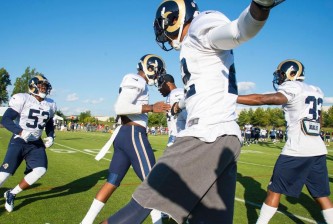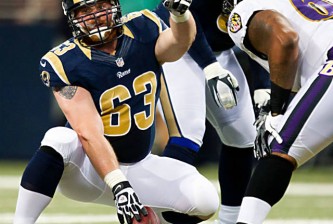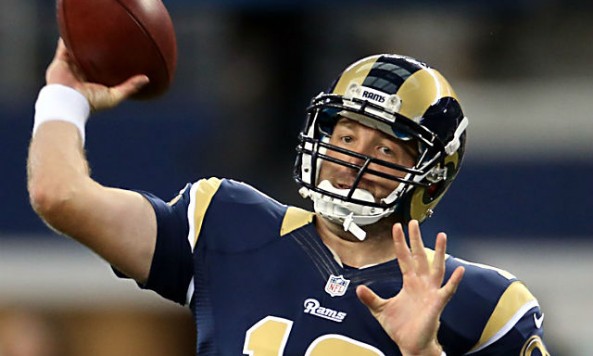I was asked a question, one that has been bedeviling me all week long. How can the Rams beat the Seahawks?
The people asking me are the fine folks at Covers.com, and as far as I know, they weren't trying to be mean. Because, really. Without Sam Bradford and with our defensive coverage schemes in complete and utter shambles, how could a person with a logical, orderly mind conceive of a win over one of the NFL's very best teams? Or better yet, how could I?
We'd like you to provide three reasons why the Rams can at least cover the spread, or even win outright, said the nice people. Well, covering the spread is one thing, and I gave them the three best reasons I could.
In short, the logical, orderly reasons begin and end with our defensive line and their ability to change the course of the game. And there are reasons for optimism. The Rams have sacked Wilson 8 times in two meetings, more than any other team, and his offensive line has gotten significantly worse since our last meeting. Moreover, his vaunted running ability has not been much of a factor vs any of his divisional foes. The Rams, 49ers and Cardinals have three of the six best (read: lowest) yards-per-carry averages allowed vs Wilson. Finally, and this is a weird little stat, Wilson's QB rating goes down by almost 40 points indoors (72.0) as compared to outdoors (110.3).
Turn any team one-dimensional on the road, and even a bad team has a chance to keep a game close. But winning a game outright? That is going to require some magic.
The same kind of magic that we saw from AJ Feeley in a week 8 game two years ago, when the Rams pulled off a colossal upset against the New Orleans Saints. Let's revisit that game and see if that same magic has any chance of carrying over to Monday night.
Comparing Juggernauts
Comparitively speaking, the Saints and Seahawks are nearly equals in formidability, taking into account a shift in personalities. The Saints believe strongly that the best defense is a balls-to-the-walls offense that takes more conservative teams (most teams, really) out of their comfort zones. The Seahawks, on the other hand, have been among the most run-heavy teams in the NFL since Wilson's arrival, depending on their defense to play shutdown football and benefiting from Wilson's knack for creating huge plays, especially on the run.
Regardless of style, each model has been effective. The 2011 Saints averaged 34 points per game and allowed just 21. The 2013 Seahawks are averaging 27 points per game, and allowing just 16. Either way, you're staring down a double-digit deficit on the scoreboard, most nights.
Comparing Underdogs
2011 was supposd to be the Rams' return to contender. Sam Bradford was coming off OROY honors, Billy Devaney had pushed all his chips in during free agency, and Steve Spagnuolo was willing to go outside his comfort zone to bring in the game's most feared offensive prodigy, Josh McDaniels. That all got blown to hell when both Steven Jackson and Danny Amendola went down in week 1, followed soon after by Sam Bradford and pretty much the entire starting secondary. You were left with a team that could run a little and get after the passer, and that was about it.
2013 saw a lot of pundits circle the Rams as their dark horse candidate for contention, even though it was widely accepted that the team was still a full season away from completing their rebuild. The season opened on a series of rocky notes, but had gotten back to respectability until Bradford was lost for the season. We are left with a team that can run a little and get after the passer, and that's about it.
Keys to a Miracle
Rewatching the game, here are the points that stood out as key to the win:
Establish a physical run front, and throw deep from that front. When teams know you have a crap quarterback, they'll stack the box against the run, bringing eight or more up and leaving the back end of the defense alone on an island. The Rams' response was to take deep shots early and often. Despite only completing two passes beyond 10 yards, the tactic opened up running and passing lanes and let the Rams stay balanced.
Take away the opponent's most dangerous threat. Facing the Saints, this meant getting to Brees and taking away his deep ball. The Rams ended up getting a pressure, hit or sack on 28 of Brees' 49 dropbacks. As a result, Brees often pulled the ball down to lesser targets, and was unable to complete any of the deep passes (20+ yards) that so often terrorize opponents.
Get great contributions from unlikely sources. The Rams' secondary was in the process of being decimated, but at the time we had a still-healthy Al Harris able to be pressed into full-time duty. Harris played with his hair literally on fire. Someone called "Josh Gordy" had his first NFL start and was outstanding. Combined with Darian Stewart, they forced 8 of Brees' 13 incompletions and picked him off twice.
Get creative. Even without Bradford, the Rams offensive play design was as creative that day as any we'd seen all season. You saw quick-pitches and sideline screens and rub routes executed to perfection. You saw end arounds and even a full-on reverse with the QB lead-blocking. You saw McDaniels systematically attack all three levels of the Saints defense. Whether or not the attacks worked, it forced the defense to account for the next attack.
Be aggressive. In addition to taking big shots, the Rams took big chances on small opportunities. They converted multiple 4th-and-2 tries on the Saints' side of the field, and both set up scores. They got two downhill scoring chances in the final two minutes of the first half and went for the throat both times.
Get lucky. The Saints missed an early scoring opportunity when a long field goal try appeared to hit a crosswind. In a dome. Multiple up-for-grabs balls thrown by Feeley landed harmlessly on the turf. The Rams got a punt block and career firsts from multiple players.
All these factors added up to a 31-21 win over the Saints that wasn't even as close as that. If not for an egregious drop by Brandon Lloyd in the 4th quarter and some fumble luck by the Saints' defense, the game could have been a blowout.
Can this kind of magic repeat itself? Luck is its own master, but the other five factors fall within the purview of the coaching staff and the players on field. It's certainly possible. The football never bounces true.























